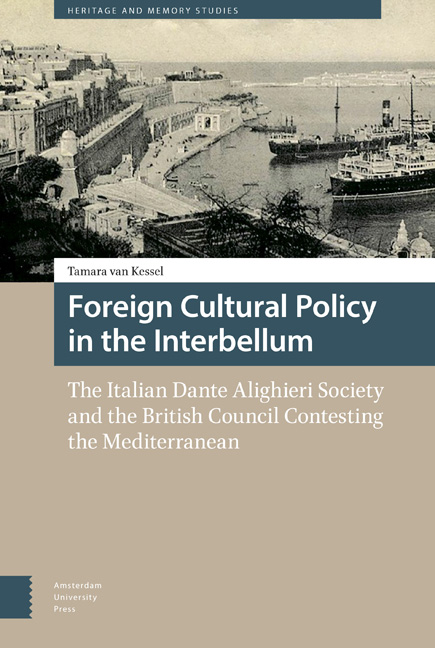 Foreign Cultural Policy in the Interbellum
Foreign Cultural Policy in the Interbellum Book contents
- Frontmatter
- Contents
- List of Illustrations
- Introduction
- 1 The Development of Foreign Cultural Policy
- 2 The Dante Alighieri Society and the British Council: Agency and Independence
- 3 Constructions of ‘Italianità’ and ‘Britishness’
- 4 The Battle for Cultural Hegemony in Malta
- 5 National Culture and Imperial Conquest: The Dante Alighieri Society in Abyssinia and the British Council in Egypt
- Conclusion
- Acknowledgements
- Bibliography
- Index
3 - Constructions of ‘Italianità’ and ‘Britishness’
Published online by Cambridge University Press: 12 February 2021
- Frontmatter
- Contents
- List of Illustrations
- Introduction
- 1 The Development of Foreign Cultural Policy
- 2 The Dante Alighieri Society and the British Council: Agency and Independence
- 3 Constructions of ‘Italianità’ and ‘Britishness’
- 4 The Battle for Cultural Hegemony in Malta
- 5 National Culture and Imperial Conquest: The Dante Alighieri Society in Abyssinia and the British Council in Egypt
- Conclusion
- Acknowledgements
- Bibliography
- Index
Summary
Both the Dante Alighieri Society and the British Council aimed to promote an image of their national culture. How this image was constructed and communicated differed greatly between the two organizations. The way in which concepts of italianità and ‘Britishness’ were defined reflects the role that cultural heritage was given within the internal national politics of Italy and Britain. Not surprisingly, given that the nation-state Italy had only been created in 1861, ‘Italianness’ remained an abstract idea, described in terms of spirit and genius. With Mussolini's rise to power, italianità also began to embody specific values and a model of society, the corporatist state. The regime recognized the part that Italy's cultural heritage could play in gaining international prestige and sought to find the best way to present the nation abroad. Yet the Italianness that the Dante Alighieri Society wished to spread remained very much defined by the Romantic ideal of the national soul expressed through the language and the arts. Despite the totalitarian nature of the state that the Dante was functioning in, which in actual fact left much room for different artistic styles and cultural expressions, its Italianness never showed the same degree of coherence as the idea of ‘Britishness’ held high by the British Council. We see from the publications of the British Council that it had a very consistent representation of ‘Britishness’ and, unlike the Dante, sought to promote particular British institutions such as its parliamentary democracy, its justice system, or its educational system. Reinforcing its self-image of pragmatism, the Council put an emphasis on language learning, through which a better understanding of British life and thought would follow. Furthermore, the choice of image was conditioned by the specific target group that the Council generally had in mind: pro-British foreign elites. Both organizations, for different reasons, had an ambivalent relationship with the emerging mass culture, although they were at the same time aware of the new modes of mass communication that were beginning to play an important part in the (international) public sphere. To capture the italianità of the Dante I will be analyzing the cruises that the Society organized for its members and a number of articles in its internal review, the Pagine della Dante.
- Type
- Chapter
- Information
- Foreign Cultural Policy in the InterbellumThe Italian Dante Alighieri Society and the British Council Contesting the Mediterranean, pp. 101 - 140Publisher: Amsterdam University PressPrint publication year: 2016


